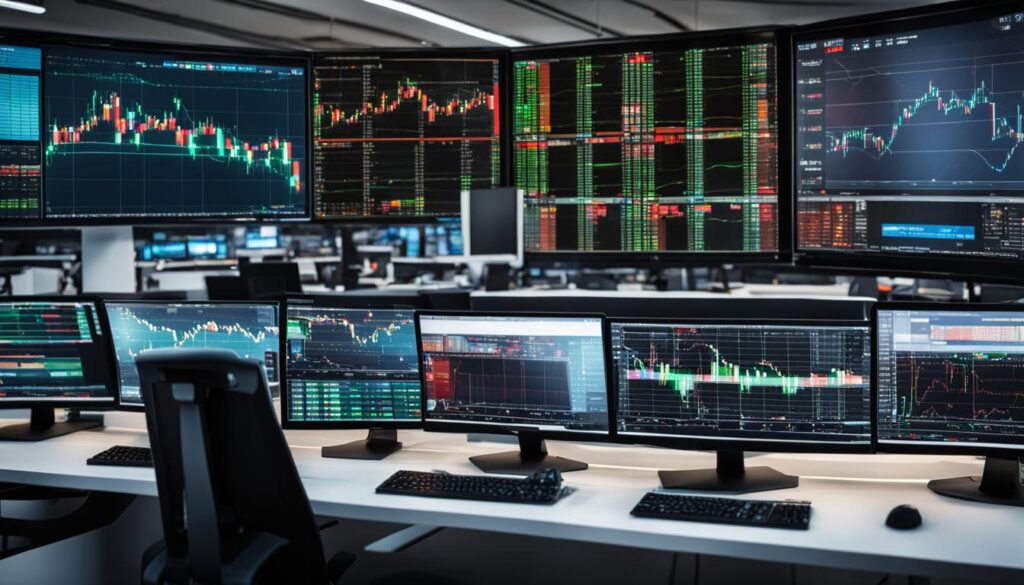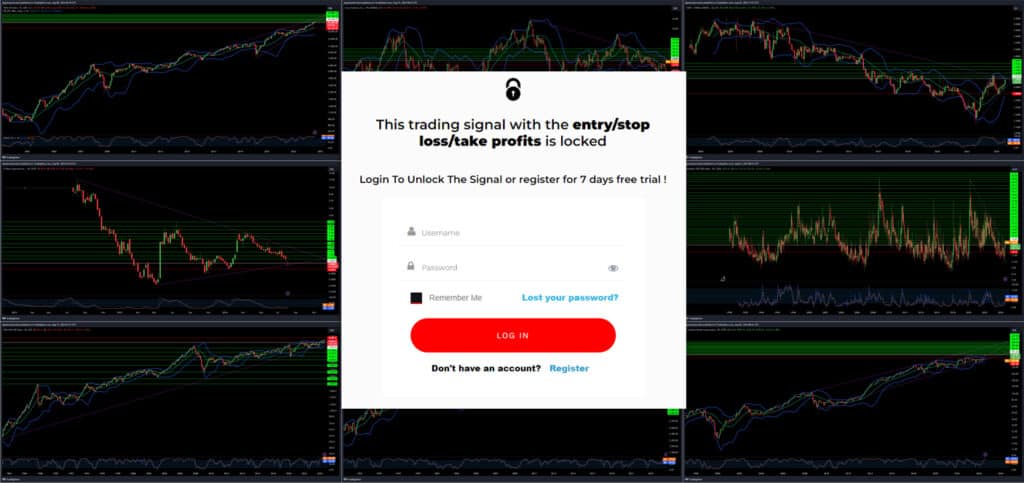I am excited to delve into the fascinating world of AI and machine learning in stock market trading. These cutting-edge technologies are revolutionizing the way we approach investment strategies, propelling us towards a smarter and more efficient future. With their unparalleled capabilities in analyzing vast amounts of data, making predictions, and automating trading processes, AI and machine learning are truly revolutionizing the stock market landscape.
Key Takeaways:
- AI and machine learning are transforming investment strategies in the stock market.
- These technologies can analyze large volumes of data, make predictions, and automate trading processes.
- Benefits of AI and machine learning in stock market trading include improved decision-making, increased efficiency, and higher returns.
- Challenges include data quality, market volatility, and regulatory concerns.
- The future of AI and machine learning in stock market trading holds immense potential for advancements and integration with human traders.
The Role of AI and Machine Learning in Trading
AI and machine learning techniques have revolutionized the field of stock market trading, empowering traders to make more informed decisions based on accurate data analysis. The ability of these technologies to analyze vast volumes of data with incredible speed and accuracy has transformed the trading landscape.
Machine learning techniques, such as neural networks and deep learning algorithms, play a pivotal role in enabling computers to learn from data and identify patterns and trends. By leveraging these techniques, traders can develop sophisticated prediction models and algorithmic trading systems that automatically execute trades based on predefined rules and algorithms.
The integration of AI and machine learning in trading has brought numerous benefits. With their unparalleled ability to process data, these technologies provide traders with valuable insights, helping them to identify hidden trends and make data-driven decisions. Furthermore, algorithmic trading systems powered by AI and machine learning algorithms can execute trades with speed and efficiency, reducing human errors and maximizing trading opportunities.
AI and machine learning have transformed the way traders make decisions and execute trades. These technologies have not only increased the efficiency of trading operations but have also enhanced the accuracy and precision of predictions, thereby improving profits and mitigating risks.
To illustrate the role of AI and machine learning in trading, consider the following example:
| AI Techniques | Data Analysis | Algorithmic Trading | Prediction Models |
|---|---|---|---|
| Neural Networks | Analyze large volumes of historical and real-time data | Automatically execute trades based on predefined rules | Predict future market trends and price movements |
| Deep Learning Algorithms | Identify complex patterns and correlations in data | Reduce human intervention and minimize emotional bias | Optimize trading strategies based on analysis of vast data sets |
As depicted in the table above, AI techniques like neural networks and deep learning algorithms enable traders to leverage data analysis, algorithmic trading, and prediction models to make informed trading decisions and execute trades more efficiently.
With the continuous advancement of AI and machine learning technologies, traders can expect further enhancements in trading practices and strategies. By harnessing the power of these technologies, traders can gain a competitive edge in the fast-paced world of stock market trading.
Benefits of AI and Machine Learning in Stock Market Trading
The use of AI and machine learning in stock market trading offers several benefits. These technologies have the capability to analyze vast amounts of data in real-time, allowing traders to quickly identify patterns and trends that may not be apparent to human traders.
This leads to more informed decision-making and can help traders capitalize on market opportunities.
Additionally, AI and machine learning can automate trading processes, reducing the need for manual intervention and increasing efficiency. This automation can result in faster execution of trades and reduced costs, giving traders a competitive edge in the market.
In summary, the integration of AI and machine learning in stock market trading can lead to higher returns and improved trading strategies, ultimately providing traders with a distinct advantage in the fast-paced and dynamic world of finance.
“AI and machine learning have revolutionized trading by empowering traders to make more informed decisions, identify market opportunities, and automate trading processes.”
Challenges and Limitations of AI and Machine Learning in Stock Market Trading
While AI and machine learning offer significant advantages in stock market trading, there are also challenges and limitations that traders must consider. These factors can impact the effectiveness and reliability of these technologies in the trading environment. Let’s explore some of the key challenges:
Data Quality and Bias
One of the primary challenges in leveraging AI and machine learning in stock market trading is ensuring the quality and unbiased nature of the data used. These technologies heavily rely on historical data to make predictions and decisions. If the data is of poor quality or biased, it can result in inaccurate predictions and flawed trading strategies.
Market Volatility and Unpredictable Events
The ever-changing nature of the stock market poses a significant challenge for AI and machine learning systems. Market volatility, sudden market shifts, and unpredictable events can disrupt the patterns and trends that these technologies utilize to make predictions. Traders must be cautious when relying solely on historical data-driven strategies during times of market turbulence.
Regulatory Concerns
The use of AI and machine learning in trading raises regulatory concerns, particularly around transparency and accountability. As these technologies become more prominent in the financial industry, regulators are scrutinizing their effects on market fairness and the potential for systemic risk. Traders and market participants must acknowledge and comply with relevant regulations to maintain trust and integrity in the trading landscape.
Addressing Limitations
While these challenges exist, it’s important to note that they can be mitigated with careful consideration and proactive measures. Traders must focus on ensuring data quality, reducing bias, and incorporating risk management strategies that account for market volatility. Additionally, industry collaboration and ongoing dialogue with regulators are essential to responsibly navigate the evolving landscape of AI and machine learning in stock market trading.
“The challenges and limitations associated with AI and machine learning in trading underscore the need for a holistic approach. By combining human expertise, robust risk management frameworks, and continuous improvement of algorithms, we can maximize the benefits while minimizing potential drawbacks.”
– Adam Smith, Head of Trading Strategies at XYZ Investments
Overall, the challenges and limitations of AI and machine learning in stock market trading require thoughtful consideration and proactive measures. Traders must be aware of data quality, market volatility, and regulatory concerns to effectively incorporate these technologies into their strategies and leverage their benefits while managing the associated risks.
The Future of AI and Machine Learning in Stock Market Trading
The future of AI and machine learning in stock market trading is filled with exciting possibilities. Advancements in machine learning techniques, such as reinforcement learning and natural language processing, have the potential to revolutionize trading algorithms and prediction models. These advancements enable computers to learn from data and make more accurate predictions, improving decision-making and boosting trading strategies.
One of the key areas of focus in the future of AI and machine learning in trading is the integration of human traders with AI systems. While machines excel at analyzing vast amounts of data and identifying patterns, human traders possess unique skills such as intuition and adaptability. By combining the strengths of both humans and machines, traders can leverage the power of AI to enhance their decision-making processes and generate superior trading outcomes.
However, as AI and machine learning technology continues to evolve and reshape the stock market trading landscape, ethical considerations come to the forefront. Questions of fairness, bias, and responsibility arise when leveraging AI and machine learning in trading. It is crucial for traders and market participants to engage in ongoing discussions and develop ethical guidelines to ensure the responsible and ethical use of these technologies.
As we move forward, staying informed and adapting to the advancements in AI and machine learning will be imperative for traders. The future holds immense potential for these technologies to further enhance trading strategies, improve efficiency, and generate higher returns. By embracing the future of AI and machine learning in stock market trading, traders can position themselves to thrive in an ever-evolving market.
Machine Learning Advancements
In the future, machine learning advancements will continue to push the boundaries of stock market trading. Reinforcement learning, a subfield of machine learning, focuses on developing algorithms that allow computers to learn and make decisions based on trial and error. This approach has the potential to revolutionize trading strategies by continuously adapting and improving based on real-time market conditions.
Natural language processing, another area of machine learning advancement, enables computers to analyze and interpret human language. This has significant implications for trading, as it allows for the extraction of valuable insights from news articles, social media feeds, and other textual data sources. By incorporating natural language processing techniques into trading systems, traders can gain a deeper understanding of market sentiment and adjust their strategies accordingly.
With these and other machine learning advancements on the horizon, the future of stock market trading holds immense promise. Traders who embrace these technologies and adapt to the evolving landscape will have a competitive edge in the market.
Integration of Human Traders
In the future, the successful integration of human traders with AI and machine learning systems will be crucial for achieving optimal trading outcomes. While machines excel at data analysis and trend identification, human traders possess unique cognitive abilities and intuition that can contribute to strategic decision-making.
The key lies in finding the right balance between the strengths of humans and machines. By leveraging AI technology to process and analyze vast amounts of data, human traders can focus on high-level decision-making and strategy development. This collaboration can lead to more effective risk management, enhanced trading strategies, and improved overall performance.
Moreover, the integration of human traders can also help address ethical concerns related to AI and machine learning in trading. Human oversight and decision-making can help ensure fairness, accountability, and transparency in trading practices.
Ethical Considerations
The increasing use of AI and machine learning in stock market trading gives rise to ethical considerations that should not be ignored. As these technologies play a more prominent role in decision-making, it is essential to address fairness, bias, and responsibility in their implementation.
Ensuring fairness in AI and machine learning algorithms is a critical aspect of ethical considerations. Bias in data or algorithms can lead to discriminatory outcomes and unfair advantages for certain market participants. Striving for fairness requires careful consideration of data sources, model training, and continuous monitoring to detect and rectify biases.
Additionally, the responsible use of AI and machine learning in trading means maintaining transparency and accountability. Traders and market participants must understand how AI-driven decisions are made and be able to explain them to clients, regulators, and the wider market.
| Ethical Considerations in AI and Machine Learning in Trading |
|---|
| Fairness in algorithmic decision-making |
| Addressing bias in data and algorithms |
| Transparency and explainability of AI-driven decisions |
| Accountability for outcomes and consequences |
As AI and machine learning technology continues to evolve, it is essential for traders and market participants to engage in ongoing discussions, establish ethical guidelines, and ensure responsible and ethical use of these technologies in the stock market trading industry.
Conclusion
AI and machine learning technologies are revolutionizing stock market trading, offering immense potential to transform investment strategies and shape the future of the market. With improved decision-making, increased efficiency, and higher returns, these powerful tools are becoming vital for traders in the evolving landscape.
However, it is crucial to acknowledge the challenges and limitations that come with AI and machine learning in stock market trading. Data quality, market volatility, and regulatory concerns pose significant hurdles that must be addressed. Traders should remain informed and adaptable as technology continues to evolve.
By effectively leveraging AI and machine learning and addressing associated challenges, traders can position themselves for success. In this dynamic environment, staying ahead of advancements in technology is key to navigating the stock market landscape and capitalizing on opportunities.
FAQ
How are AI and machine learning revolutionizing stock market trading?
AI and machine learning are revolutionizing stock market trading by enabling improved decision-making, increased efficiency, and higher returns. These technologies can analyze large volumes of data with incredible speed and accuracy, allowing traders to make more informed decisions and automate trading processes.
What is the role of AI and machine learning in stock market trading?
AI and machine learning have a crucial role in stock market trading. They can analyze vast amounts of data, make predictions based on patterns and trends, and execute trades automatically. These technologies enable traders to identify patterns and trends that may not be apparent to human traders and increase the efficiency of trading processes.
What are the benefits of using AI and machine learning in stock market trading?
The use of AI and machine learning in stock market trading offers several benefits. These technologies can analyze vast amounts of data in real-time, allowing traders to quickly identify patterns and trends. They also automate trading processes, reducing the need for manual intervention and increasing efficiency. Overall, this integration can lead to higher returns and improved trading strategies.
What are the challenges and limitations of using AI and machine learning in stock market trading?
There are challenges and limitations to consider when using AI and machine learning in stock market trading. Data quality and bias can impact the accuracy of prediction models and algorithms. Market volatility and unpredictable events can disrupt trading strategies based on historical patterns. Regulatory concerns about transparency and accountability also exist.
What does the future hold for AI and machine learning in stock market trading?
The future of AI and machine learning in stock market trading looks promising. Advancements in machine learning techniques are being explored to improve trading algorithms and prediction models. There is also a growing focus on integrating human traders with AI and machine learning systems. Ethical considerations are emerging as well, and traders and market participants need to adapt to these changes.
Source Links
- https://finance.yahoo.com/news/victory-square-portfolio-company-xr-173000533.html
- https://stocknews.com/news/fjtsy-tdy-ltrx-qcom-3-tech-stocks-investors-are-buying-in-2024/
- https://www.rebellionresearch.com/what-gpa-do-you-need-to-get-into-stony-brook-is-suny-stony-brook-hard-to-get-into
Disclaimer
All information on this website is of a general nature. The information is not adapted to conditions that are specific to your person or entity. The information provided can not be considered as personal, professional or legal advice or investment advice to the user.
This website and all information is intended for educational purposes only and does not give financial advice. Signal Mastermind Signals is not a service to provide legal and financial advice; any information provided here is only the personal opinion of the author (not advice or financial advice in any sense, and in the sense of any act, ordinance or law of any country) and must not be used for financial activities. Signal Mastermind Signals does not offer, operate or provide financial, brokerage, commercial or investment services and is not a financial advisor. Rather, Signal Mastermind Signals is an educational site and a platform for exchanging Forex information. Whenever information is disclosed, whether express or implied, about profit or revenue, it is not a guarantee. No method or trading system ensures that it will generate a profit, so always remember that trade can lead to a loss. Trading responsibility, whether resulting in profits or losses, is yours and you must agree not to hold Signal Mastermind Signals or other information providers that are responsible in any way whatsoever. The use of the system means that the user accepts Disclaimer and Terms of Use.
Signal Mastermind Signals is not represented as a registered investment consultant or brokerage dealer nor offers to buy or sell any of the financial instruments mentioned in the service offered.
While Signal Mastermind Signals believes that the content provided is accurate, there are no explicit or implied warranties of accuracy. The information provided is believed to be reliable; Signal Mastermind Signals does not guarantee the accuracy or completeness of the information provided. Third parties refer to Signal Mastermind Signals to provide technology and information if a third party fails, and then there is a risk that the information may be delayed or not delivered at all.
All information and comments contained on this website, including but not limited to, opinions, analyzes, news, prices, research, and general, do not constitute investment advice or an invitation to buy or sell any type of instrument. Signal Mastermind Signals assumes no responsibility for any loss or damage that may result, directly or indirectly, from the use or dependence on such information.
All information contained on this web site is a personal opinion or belief of the author. None of these data is a recommendation or financial advice in any sense, also within the meaning of any commercial act or law. Writers, publishers and affiliates of Signal Mastermind Signals are not responsible for your trading in any way.
The information and opinions contained in the site are provided for information only and for educational reasons, should never be considered as direct or indirect advice to open a trading account and / or invest money in Forex trading with any Forex company . Signal Mastermind Signals assumes no responsibility for any decisions taken by the user to create a merchant account with any of the brokers listed on this website. Anyone who decides to set up a trading account or use the services, free of charge or paid, to any of the Broker companies mentioned on this website, bears full responsibility for their actions.
Any institution that offers a service and is listed on this website, including forex brokers, financial companies and other institutions, is present only for informational purposes. All ratings, ratings, banners, reviews, or other information found for any of the above-mentioned institutions are provided in a strictly objective manner and according to the best possible reflection of the materials on the official website of the company.
Forex/CFD trading is potentially high risk and may not be suitable for all investors. The high level of leverage can work both for and against traders. Before each Forex/CFD investment, you should carefully consider your goals, past experience and risk level. The opinions and data contained on this site should not be considered as suggestions or advice for the sale or purchase of currency or other instruments. Past results do not show or guarantee future results.
Neither Signal Mastermind Signals nor its affiliates ensure the accuracy of the content provided on this Site. You explicitly agree that viewing, visiting or using this website is at your own risk.




